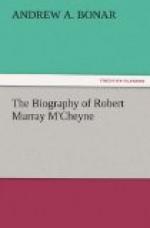An interesting anecdote is related of him by a co-presbyter, who returned with him to Dundee after the Convocation. This co-presbyter, Mr. Stewart, was conversing with him as to what it might be their duty to do in the event of the disruption, and where they might be scattered. Mr. Stewart said he could preach Gaelic, and might go to the Highlanders in Canada, if it were needful. Mr. M’Cheyne said, “I think of going to the many thousand convicts that are transported beyond seas, for no man careth for their souls.”
We have not many records of his public work after this date. Almost the last note in his diary is dated December 25: “This day ordained four elders, and admitted a fifth, who will all, I trust, be a blessing in this place when I am gone. Was graciously awakened a great while before day, and had two hours alone with God. Preached with much comfort on I Tim. 5:17, ‘Let the elders that rule well,’ etc. At the end of the sermon and prayer, proposed the regular questions; then made the congregation sing standing; during which time I came down from the pulpit and stood over the four men, then prayed, and all the elders gave the right hand of fellowship, during which I returned to the pulpit, and addressed them and the congregation on their relative duties. Altogether a solemn scene.”
The last recorded cases of awakening, and the last entry in his diary, is dated January 6, 1843: “Heard of an awakened soul finding rest—true rest, I trust. Two new cases of awakening; both very deep and touching. At the very time when I was beginning to give up in despair, God gives me tokens of his presence returning.”
He here speaks of discouragement, when God for a few months or weeks seemed to be withholding his hand from saving souls. If he was not right in thus hastily forgetting the past for a little, still this feature of his ministry is to be well considered. He entertained so full a persuasion that a faithful minister has every reason to expect to see souls converted under him, that when this was withheld, he began to fear that some hidden evil was provoking the Lord and grieving the Spirit. And ought it not to be so with all of us? Ought we not to suspect, either that we are not living near to God, or that our message is not a true transcript of the glad tidings, in both matter and manner, when we see no souls brought to Jesus? God may certainly hide from our knowledge much of what He accomplishes by our means, but as certainly will He bring to our view some seals of our ministry, in order that our persuasion of being thus sent by Him may solemnize and overawe us, as well as lead us on to unwearied labor. Ought it not to be the inscription over the doors of our Assembly and College halls: “Thanks be unto God, which always causeth us to triumph in Christ, and maketh manifest the savour of his knowledge by us in every place?” II Cor. 2:14.




